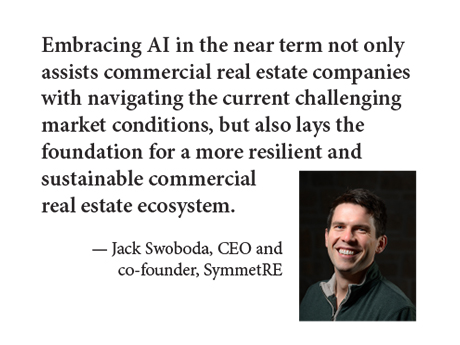— By Jack Swoboda and Ross Piermarini, co-founders, SymmetRE —
We are living in a unique moment. A transition period. The advancements made in artificial intelligence (AI) in the past year have put a massive spotlight on the technology. Practical use cases that were once a dream are now becoming a reality.
Before we dig deeper into the effects AI can have within commercial real estate, it is important to first define the types of technologies we are talking about. The term “artificial intelligence” gets thrown around pretty freely these days, so we want to be clear.
At its highest level, AI in commercial real estate will utilize language learning models (LLMs) and machine learning to synthesize large amounts of data and then communicate that information back to the users in a language they understand.

Commercial real estate is still in the early stages of exploring how best to utilize these new tools. It is unknown as to where within a firm AI is going to take hold first or how fast it will be adopted. However, given the industry’s longstanding reputation of being conservative and resistant to change, adoption likely will be driven out of necessity.
As commercial real estate has become more institutionalized, the expectations for owners to run more efficient and transparent operations have increased drastically. Fanning the flames is a high interest rate environment that is putting serious strain on owners’ cash flows.
To navigate these challenging market conditions, commercial real estate owners will need to utilize tools that allow them to optimize performance without increasing overall costs. Utilizing AI for personalized tenant experiences has value, but will it really hit the bottom line and allow firms to survive the current market turmoil? Here, we explore three use cases that are most likely to get near-term adoption.
Automated Marketing
Marketing is a great example of where AI is likely to have strong near-term adoption because of the “free” technologies that are already available. Why hire a team of marketing professionals when one person utilizing ChatGPT can be just as effective, if not better, at producing creative copy and campaign ideas?
Applications of AI that have no cost barrier will certainly see very quick initial adoption but there will also be opportunities for more advanced applications. AI can be used for smarter and more precise targeting of prospects to improve lead conversions. It can also be used to better understand current tenant satisfaction in order to produce better content that actually drives ROI.
Automated Leasing / Tenant Screening
The current leasing process is very dependent on human interactions and thus requires a significant amount of time from a fairly large team. Every month, hundreds of leads need to be chased down to fill only a handful of vacancies at any single property.

The use of LLM’s has essentially replaced the need for overly large leasing teams as initial conversations and questions can all be answered via AI-enabled chatbots. The overwhelming majority of the tenant screening process can also be automated by utilizing AI to scrape the internet for applicant’s credit history, employment history and other important criteria to help determine the likelihood of them paying their rent on time.
While virtual tours have gained more popularity following the pandemic, in-person tours are still preferred. Thus, AI’s strongest application in this space will be focused on automating the initial leg work of the leasing processes. Owners will see immediate returns from utilizing smaller and more effective leasing teams.
Automated Asset Management / Reporting
Asset management and its related reporting processes have long been riddled with incredibly manual and tedious tasks centered around data aggregation and standardization. The issues are compounded for owners who employ third-party property managers, each utilizing different property management systems with different ways to record the data. It can take weeks for owners to reconcile their own data.
As a result, AI-enabled asset management solutions are highly likely to see quick adoption and have long-term staying power. They provide immediate, tangible ROI by automating repeatable and time-consuming tasks.
Utilizing a mix of LLM’s and machine learning, AI can completely automate data aggregation and data standardization. By doing so, real estate companies will get access to better quality data and more real-time insights. Asset management teams will finally have the time to focus on proactive performance improvement.
Additionally, in the current environment where headcount reductions are almost a certainty, owners will need a way to maintain or even improve operations. Automating asset management workstreams solves this problem.
Commercial real estate has historically been a laggard in tech implementation, but the current market conditions have created a perfect storm for adoption.
Embracing AI in the near term not only assists commercial real estate companies with navigating the current challenging market conditions but also lays the foundation for a more resilient and sustainable commercial real estate ecosystem.
Current owners who can effectively scale will have healthier companies. Lower operating costs will attract more new entrants to an industry that has been dominated by deep-pocketed titans. Healthier competition will lead to better pricing for tenants. As you can see, the effects of utilizing AI within commercial real estate can be profound, and AI ultimately will benefit all parties involved.
Jack Swoboda and Ross Piermarini are co-founders of Chicago-based technology firm symmetRE.com, which provides commercial real estate owners and operators with an AI-enabled platform that streamlines data collection and reporting for commercial real estate investors.

